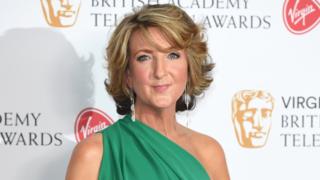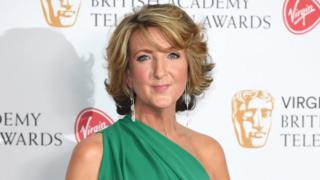Victoria Derbyshire Show to come off air as part of BBC cuts
The costs of the news and current affairs show have been “deemed too high”, our media editor says. …

 Image copyright Getty Images
Image copyright Getty Images The BBC’s award-winning Victoria Derbyshire Show is coming off air, the broadcaster’s media editor has learned.
Amol Rajan said the cost of running the news and current affairs programme on a linear channel “when savings are needed” had been “deemed too high”.
In 2016 it was announced BBC News would need to find £80m of cuts over four years.
The broadcaster is due to make an announcement about its news operation next week.
It comes after Tony Hall announced his resignation as the BBC’s director general.
‘Rigorous campaigning’
Numerous media personalities responded with shock to the news of the programme coming off air, praising its award-winning journalism.
Louisa Compton, who edited the Victoria Derbyshire Show when it was first launched, said the decision was “madness” – while ITV’s Piers Morgan said it was a “very strange” call.
Shadow culture secretary, Tracy Brabin, tweeted that the programme’s “rigorous campaigning and commitment to public having their say made it pretty unique in daytime TV”.
She said she would be looking into why the show was being taken off air.
Labour MP Jess Phillips tweeted that it was “sad to see” the end of a programme that had “reached a largely working class audience”.
Anna Collinson and Jim Reed, journalists for the programme, both called the decision “gutting”.
Amol Rajan said he understands BBC News is “committed” to the presenter and the journalism of the show.
The BBC has declined to comment.
Aired at 10:00 on BBC2 and the BBC News Channel every weekday, the show focuses on original stories, audience debates and exclusive interviews as well as breaking news.
It was launched in April 2015.
In 2017 the show won a Bafta for its news coverage of footballers’ abuse, while Derbyshire herself has won and been nominated for several awards for presenting the show.
Other exclusive stories the show has uncovered include the number of deaths linked to Xanax and the way how family courts treat victims of domestic violence.
When Victoria Derbyshire proposed a TV version of her Radio 5 Live Show to former BBC News boss James Harding, he gave her the green light within days.
BBC News has a big problem in connecting with some licence fee payers away from big cities and from poorer backgrounds – or, in the jargon, “underserved audiences”.
For Harding and BBC News, Derbyshire – and the show’s first editor, Louisa Compton (now at Channel 4) – were the solution to a big problem.
It worked – online.
Derbyshire’s programme was highly effective in reaching those people, through original journalism, investigations and scoops of a kind that the BBC generally struggles to do. But on linear TV channels it failed to garner a sufficiently big audience to justify its cost.
First it was chopped from two hours to one. Now it is gone.
BBC News is looking to make big savings and re-organise its structure so that digital journalism is prioritised.




